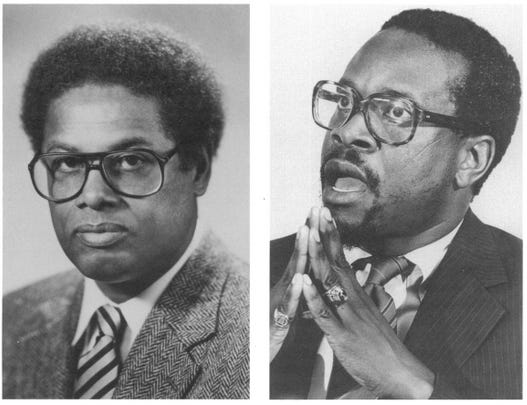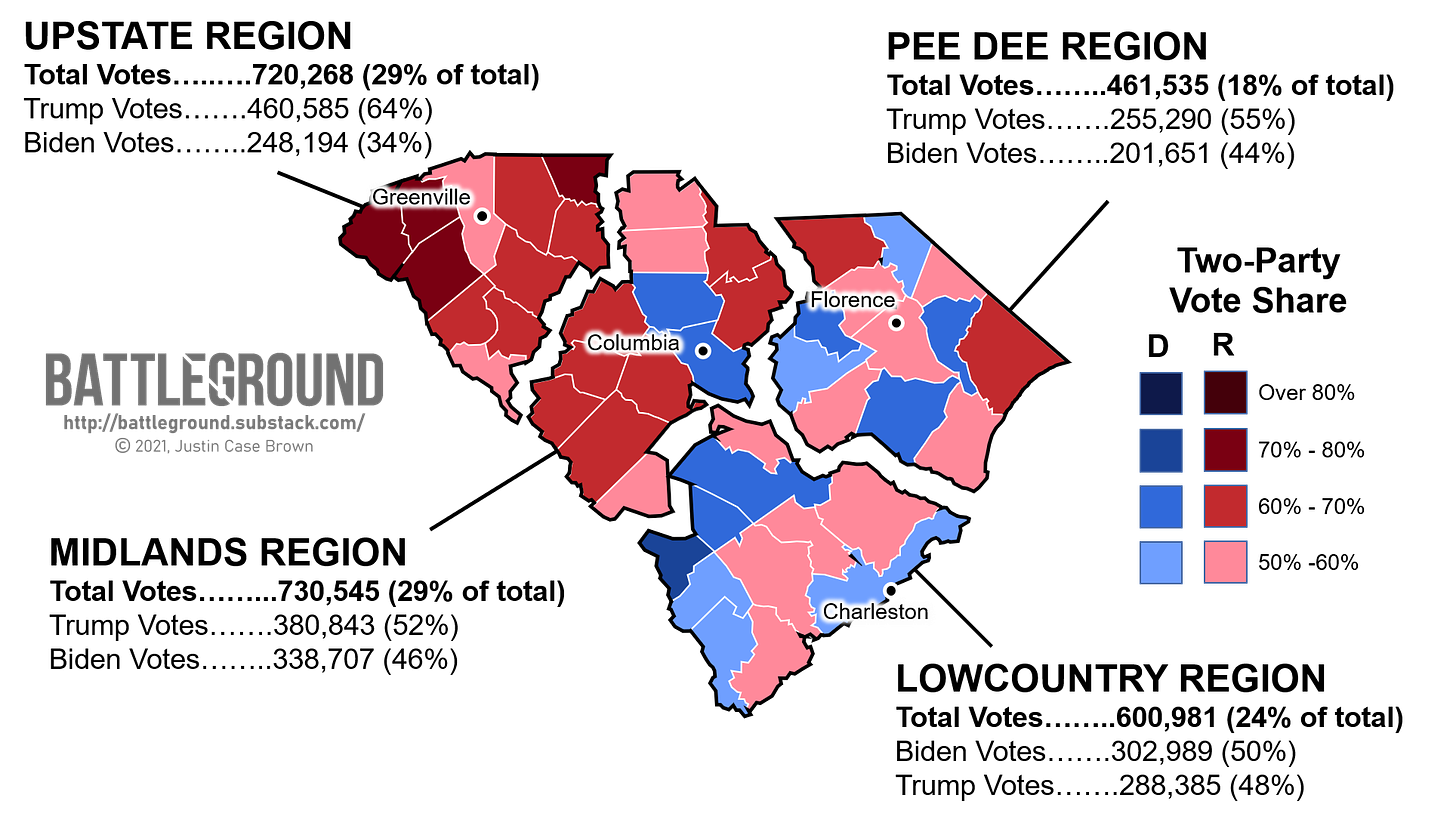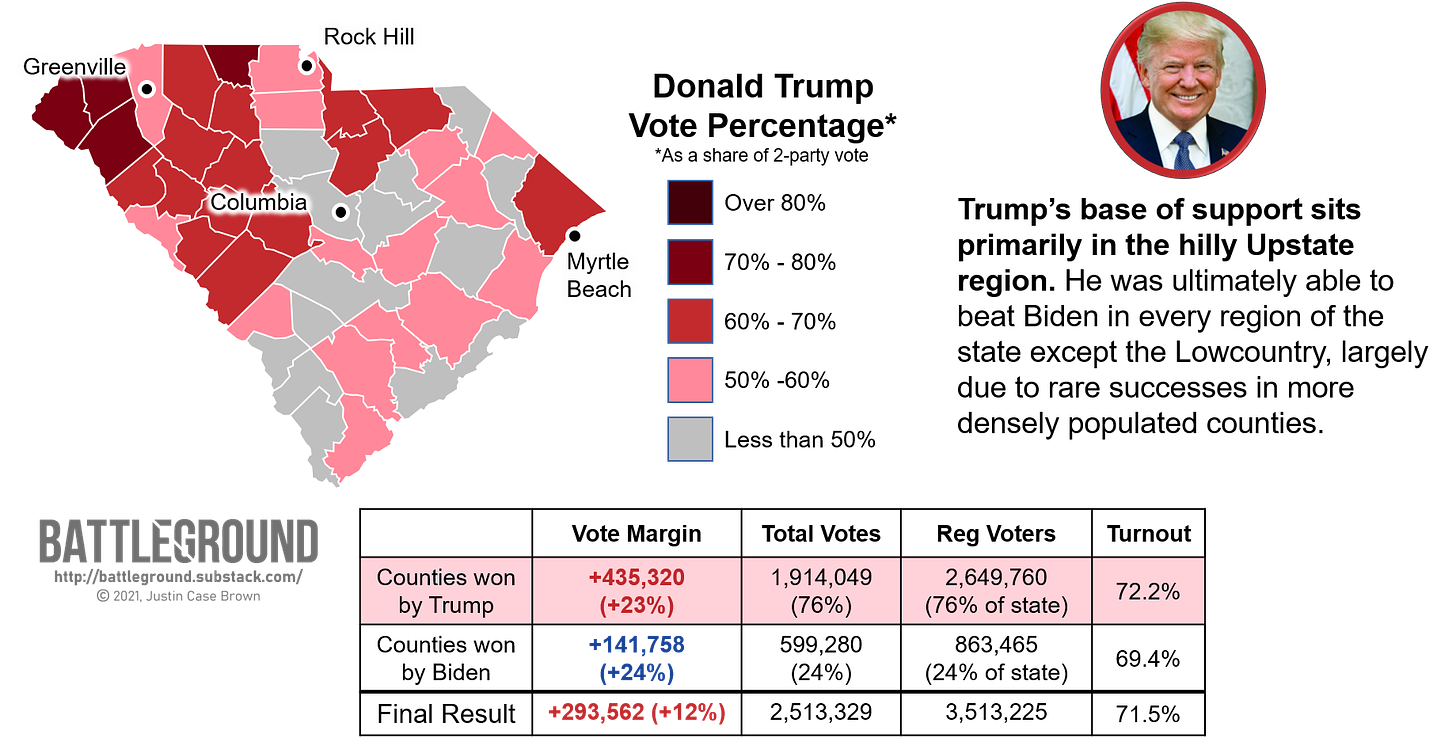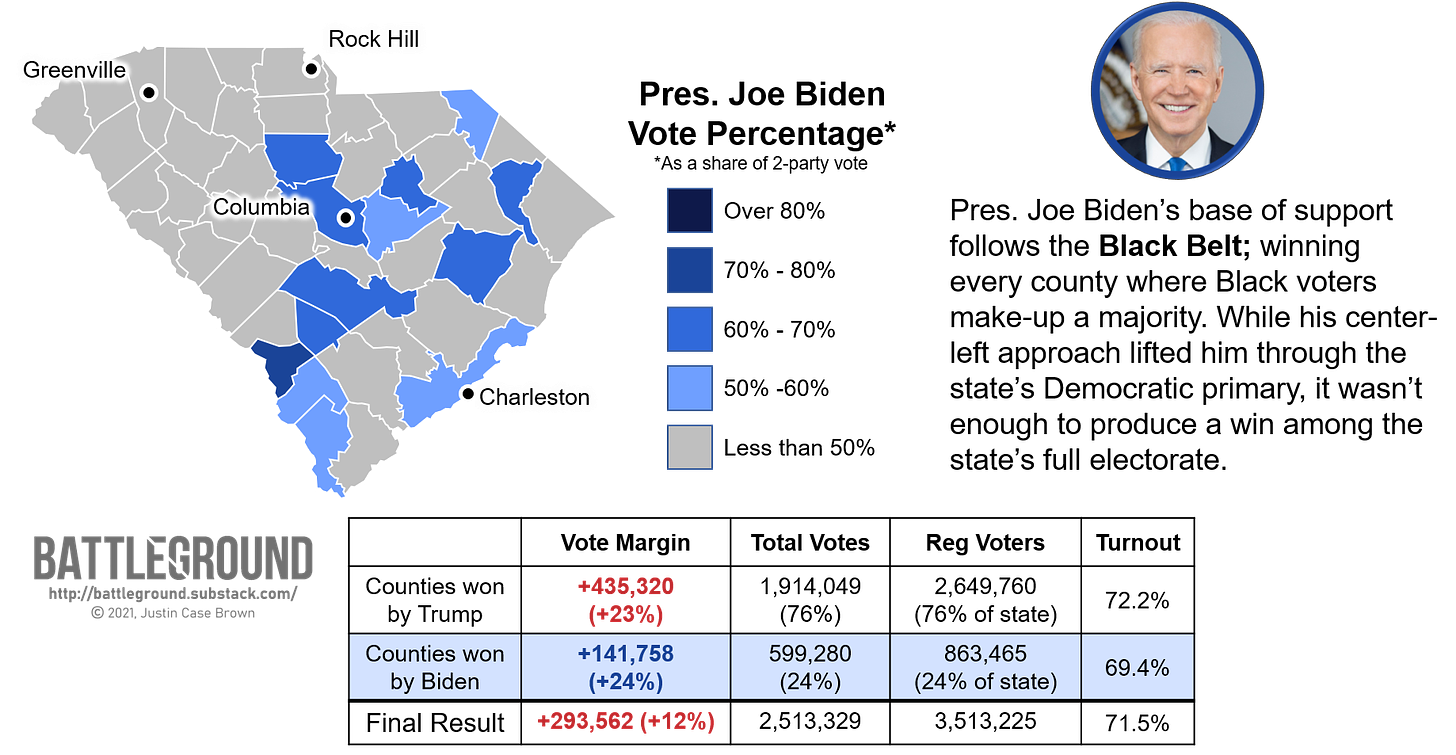South Carolina: Religious adherence v. the gender gap
Yes, Black conservatives are a real thing, just ask Sen. Tim Scott.
Topline Takeaways
Donald Trump’s win rests on the state’s heavily conservative lean. He also picked up rare wins in many of the state’s more densely, populated counties.
Sen. Tim Scott stands as a symbol for Black conservatism in the state, as a high level of religious adherence leads Black voters to back moderate and conservative candidates that share their religious ideals.
Black men are significantly more likely to support conservative candidates than Black women, leading to a gender gap in voting.
In-Depth Insights
South Carolina can be split up into four distinct geographic regions: Upstate, Midlands, Lowcountry, and the “Pee Dee” (lands previously owned by and named after the Pedee Native Americans). Using this breakdown, the Midlands and Upstate regions hold the bulk of the state’s voters and have reliably supported Republican candidates for decades. The Pee Dee and Lowcountry regions are slightly more diverse and have been much more indecisive in their voting patterns over the years.
Trump bested Biden in every region except the Lowcountry. His strongest performance was in the state’s Upstate area, where he beat Biden by a margin of nearly 2-to-1. This area is significantly less diverse than other regions of the state: in nearly all Upstate counties at least two-thirds of residents identify as White.
Trump also showed rare strength in the state’s more densely populated areas, winning Greenville, Spartanburg and Horry counties, all areas that are home to over 300,000 voters each. This is likely due to the prevalence of Black conservatives in the state, a voting bloc that benefited Trump in the general election but ultimately helped launch Joe Biden to the presidency in their support for his candidacy in the primary.
Joe Biden won every single majority Black county in South Carolina, capturing over 60% of the vote in most of these counties. These same counties catapulted Joe Biden through the Democratic primary, past more left-wing candidates like Sanders and Warren. Biden’s center-left approach certainly resonated with African Americans, in part because his moderate stances on social issues matched up with Southern African American’s high rates of religious adherence.
While nearly 90% of African Americans nationwide voted for Joe Biden, this statistic glosses over compromises many Black voters must make when liberal ideology sits at odds with their religious beliefs. This conundrum creates a rift among Black voters that falls along gender lines: Black men have shown a significantly higher willingness to support conservative candidates than Black women. While this gender gap in voting was seen across all ethnic backgrounds in both 2016 and 2020, the gap is especially stark among African Americans. An easy example: in a 2020 poll of African Americans nationwide, 24 percent of Black men approved of Trump’s tenure in office; only 6 percent of Black women agreed.
Black conservatism is not a new phenomenon; examples include Clarence Thomas, Condoleezza Rice, and South Carolina’s current senator Tim Scott. Brad Mole, a past Republican primary candidate for South Carolina’s 1st congressional district, explains what brought him into the conservative fold:
“My faith pushed me more toward policies that better reflected my upbringing. I began understanding that the teachings I was raised with were more reflected in a party that not many around me identified with.” - Brad Mole, 2020 primary candidate for SC-1
Phillip Brown, chairman of the Alabama Minority GOP, echoes a similar experience:
“I didn’t realize that black folks weren’t Republicans… If you look at the black church, 90 percent of what you see is conservative. We believe in personal responsibility. We believe life is precious, so therefore abortion is wrong. We believe in the traditional concept of marriage. Most in minority communities believe in conservative thought, so why do we have such a disconnect between our faith in God and our actions in the voting booth?”
- Phillip Brown, chairman of the Alabama Minority GOP

Investigating gender roles may offer the answer to Philip Brown’s question on the disconnect between religious and political ideals. Women are typically the designated caretakers in their communities; their struggles during the COVID-19 pandemic helped highlight how women are on the frontlines when issues such as inadequate healthcare and economic insecurity hit home. They understand the intricacies of these problems from personal experience and are unsatisfied with conservative solutions to these issues. District Attorney Patsy Austin-Gatson, from Georgia says it plainly:
“I think women have to lead the way because we see our children and our grandchildren and don't want them to continuously inherit inequities.”
Black women have a sense of urgency after dealing with the brunt of social issues and as a result, vote at significantly higher rates compared to Black men. Even though conservatives are making inroads within the Black community, liberal ideology is what’s resonating with the voters that are most likely to show up on Election Day. Black women are the ones breaking down buzzword topics to persuade their friends and families to support liberal policy over conservative ideas.
Forecasting the Future: Whiter areas won by Trump have higher turnout rates than diverse counties where Biden was successful, signalling that any upcoming electoral shifts will lie in the political development (or lack-thereof) in the Lowcountry and Pee Dee regions. The Republican party’s decision to keep Sen. Tim Scott front and center leans into the gender gap in voting by giving representation to Black male conservatives in the party, threatening gains made by Democrats among Black women. This balance suggests that little movement should be expected among the electorate in the foreseeable future as White voters continue to follow decades-old voting patterns.
The things that we do, the strength that we have, the energy that we bring to get it done wherever - whether it's in the boardroom, whether it's in politics, whether it's at home with our families, we get it done… We aren't surprised by what we're doin', you know. This is what we have always done. The world is just now catching up to see what we bring.
- Rosalyn Glenn, Joe Biden's 2020 South Carolina coalitions director





